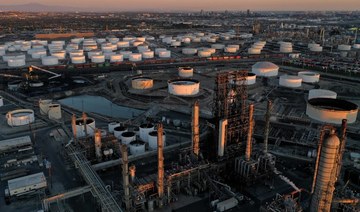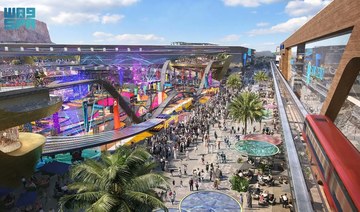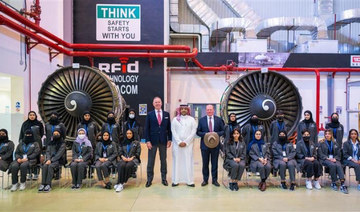LONDON: The three biggest sovereign wealth funds of oil-producing countries have been selling European equity holdings since May, a study showed, another sign of petrodollars being withdrawn from world markets.
Asian funds have meanwhile continued to add European equities, according to the data from Nasdaq Advisory Services, which provides analysis on shareholder and investor activity.
Since May, the Saudi Arabian Monetary Authority has sold $1.2 billion worth of equities across Nasdaq’s European client base. That accounts for 13 percent of its $9.2 billion holdings in the European companies tracked by Nasdaq.
Norway’s Norges Bank Investment Management has sold $1.1 billion — around 2 percent of the $57.5 billion market value of its holdings, while the Abu Dhabi Investment Authority has cut some $300 million worth of shares from its $3.6 billion holding.
“Over 2015, the three largest oil-dependent SWFs have all been reducing their equity holdings in the region, with this trend accelerating over the second quarter and into the third quarter of the year,” said Alexander Free, an analyst with Nasdaq’s Advisory Services.
The data is based on a sample of 159 European companies, with a market value of $1.87 trillion, Nasdaq says. They range from retail and telecoms shares to financials and utilities.
Falling oil prices — Brent crude is over 60 percent cheaper since summer 2014 — are pressuring oil producers to rein in spending or liquidate assets.
RECYCLING
Energy-exporting countries pulled money out of world markets last year for the first time in almost two decades, halting the “recycling” of oil windfalls, BNP Paribas has said.
This year exporters will use up the $750 billion earned from oil and also dip into central bank and sovereign warchests for an additional $100 billion, according to a JPMorgan study.
Bond purchases by sovereign and FX reserve managers will decline by $90 billion between 2014 and 2015 while equity buying will fall $200 billion, JPM said in a note sent late on Friday.
Saudi Arabia’s central bank, which serves as the wealth fund of the world’s top oil exporter, has been drawing down its reserves since late 2014. Its net foreign assets fell by $6.6 billion in August as investments were liquidated to plug a budget gap.
“It’s a pretty dire situation,” Free said.
Norway is expected to make a net withdrawal from its sovereign wealth fund this year for the first time since the SWF was set up, to help pay for tax cuts designed to stimulate the economy. Its $830 billion fund is the world’s largest, holding about 1.3 percent of global stocks.
Their withdrawal from markets may be partly offset by energy importers, however, with JPM estimating that oil savings would lead to “a positive flow change” of $90 billion for bonds and $30 billion for equities.
The Nasdaq report showed that the three biggest non-commodity-driven sovereign funds have been net buyers of European equities — particularly China’s SAFE, which holds about $35.6 billion worth of the Nasdaq sample.
SAFE started buying heavily in Europe from the first quarter of 2015, acquiring $2.1 billion of the shares tracked by Nasdaq. Singapore’s Temasek and GIC have also acquired a combined $1.1 billion of European equities so far this year, Free said.
He suggested their interest may stem from a search for better valuations as US equity prices surged to pre-crisis levels, while the European Central Bank’s money-printing program also lent support.
Top sovereign wealth funds ‘selling European shares’
Top sovereign wealth funds ‘selling European shares’
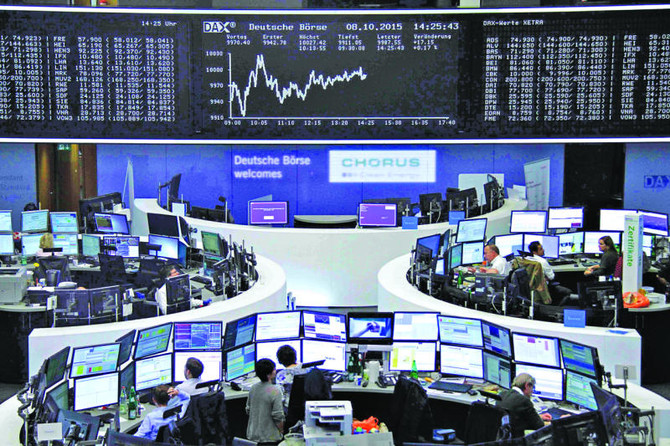
Saudi Aramco’s net profit hits $27.27bn in Q1 2024
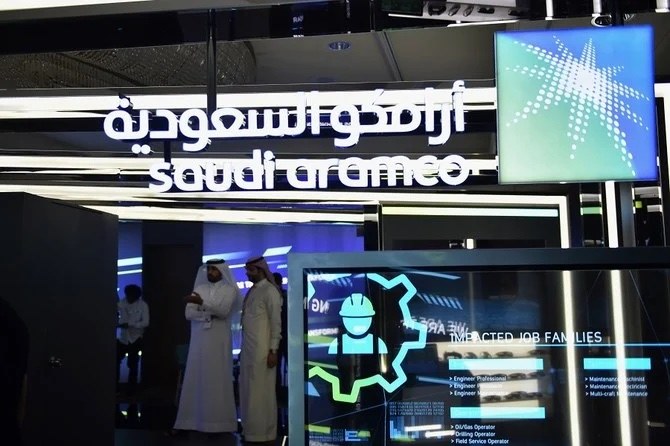
RIYADH: Energy giant Saudi Aramco reported a net profit of $27.27 billion in the first three months of this year, marking a 2.04 percent increase compared to the previous quarter.
According to the company’s statement, the state-owned oil firm’s total revenue for the first quarter stood at $107.21 billion, with the total operating income for the period reaching $58.88 billion.
Amin H Nasser, president and CEO of Saudi Aramco, said: “Our first quarter performance reflects the resilience and strength of Aramco, reinforcing our position as a leading supplier of energy to economies, to industries and to people worldwide.”
However, when compared with the first quarter of the previous year, the net profit of the Tadawul-listed firm declined by 14.44 percent by the end of March 2024.
Despite lower net income, Aramco declared a base dividend of $20.3 billion for the first quarter and anticipates distributing its fourth performance-linked dividend of $10.8 billion in the second quarter.
PIF’s Alat unveils electrification, AI infrastructure business units

RIYADH: Alat, a flagship company of the Public Investment Fund, unveiled two business units in electrification and AI infrastructure, to establish Saudi Arabia as a premier manufacturing hub globally.
The company unveiled its plans during the Milken Institute Conference held in Los Angeles.
According to a press release, the move comes as part of the PIF company’s strategic vision to spearhead a paradigm shift in industry sustainability while propelling Saudi Arabia on the global stage.
Alat Global CEO Amit Midha said: “I am pleased to announce these two exciting new divisions as they will make a significant contribution to Alat’s overall strategic goal of developing an advanced, sustainable future for the industry.”
The electrification arm will fortify grid technology, catering to the burgeoning demand for electricity driven by exponential growth in renewable energy sources like solar, wind, and hydrogen.
By harnessing Saudi Arabia’s solar energy and other clean resources, the firm seeks to manufacture innovative solutions that will catalyze the global energy transition and drive decarbonization in industry.
The electrification unit will specifically focus on enhancing transmission and distribution technologies, facilitating the integration of renewable energy into existing grids, and pioneering advancements in gas and hydrogen generation and compression technologies.
On the other front, the AI Infrastructure business unit will address the escalating global demand for AI capabilities across industries.
This entails the development of cutting-edge technologies encompassing network and communications equipment, servers, data center networking, storage, industrial edge servers, and Industry 4.0 computing.
“The global electrification market size reached $73.64 billion in 2022 and it is expected to hit around $172.9 billion by 2032, growing at a CAGR of 8.91 percent between 2023 and 2032,” the press release added.
The global AI Infrastructure market is set to hit $460.5 billion by 2033, with a robust 28.3 percent compound annual growth rate, driven by widespread adoption across industries for innovation, decision-making enhancement, and task automation.
As a gold sponsor at the Milken Institute Conference, the firm now has nine business units focused on sustainable technology manufacturing.
“Alat will invest $100 billion by 2030 across these business units to develop key partnerships and build advanced manufacturing capabilities in Saudi Arabia to bring jobs and economic diversification to the Kingdom,” the press release said.
Saudi Arabia’s Qiddiya to build region’s largest water theme park
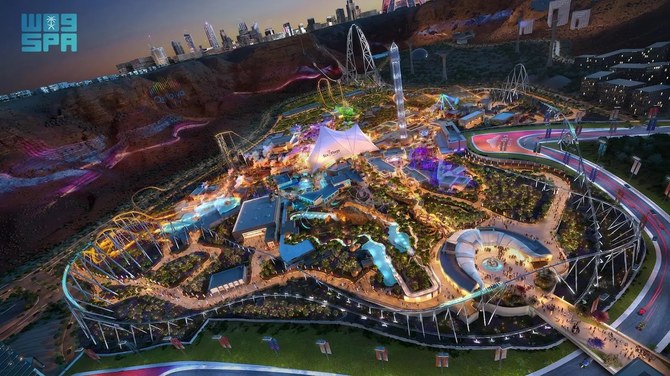
- Aquarabia will also feature the first underwater adventure trip with diving vehicles
RIYADH: Saudi Arabia Qiddiya Investment Co. will construct the region’s largest water theme park as a cornerstone of its Six Flags Qiddiya City venture it was announced on Monday.
To be named Aquarabia, Qiddiya hopes to draw visitors from around the globe with 22 attractions and water experiences suitable for all family members, as well as some “world-first” attractions, Saudi Press Agency reported.
These attractions include the world’s first double water loop, the tallest water coaster with the highest jump, the longest and highest water racing track, and the tallest water slide.
Aquarabia will also feature the first underwater adventure trip with diving vehicles, catering to adventure enthusiasts with water sports areas designated for rafting, kayaking, canoeing, free solo climbing, and cliff jumping.
Additionally, the park will introduce the first surfing pool in the Kingdom, incorporating immersive design elements themed around ancient desert water springs and Qiddiya’s wildlife.
With sustainability in mind, Aquarabia will implement advanced systems capable of reducing water waste by up to 90 percent and decreasing energy consumption. As part of the Six Flags Qiddiya project, the venture, the first Six Flags of its kind outside North America, aims to recycle operational waste, diverting over 80 percent from landfill.
Scheduled to open in 2025, both Aquarabia and Six Flags Qiddiya City are situated within Qiddiya City, forming a fully walkable neighborhood offering a diverse array of activities, accommodations, dining options, and relaxation spots.
Abdullah Al-Dawood, managing director of Qiddiya Investment Co., hailed the announcement as a significant milestone for Qiddiya and the entertainment, tourism, and sports sectors in the Kingdom.
He emphasized that the projects will cater to diverse entertainment needs while contributing to economic diversification and job creation in the tourism sector.
The project also aims to meet the growing local demand for immersive entertainment experiences, particularly in water activities, aligning with the goals of Saudi Arabia’s Vision 2030 to enhance local tourism and employment opportunities.
The unveiling of Aquarabia follows the announcement of several other entertainment, sports, and cultural attractions in Qiddiya, including the world’s first multi-use gaming and electronic sports area, the multi-sport Prince Mohammed bin Salman Stadium and the Dragon Ball amusement park.
Saudi Arabia ascends as key destination for global talent: BCG report

RIYADH: Saudi Arabia has emerged as a key player in attracting global talent amid ongoing geopolitical shifts and financial uncertainty, moving up two spots on the list of preferred countries for workforce mobility.
The “Decoding Global Talent 2024” report by Boston Consulting Group highlights Saudi Arabia’s rise to the 26th most preferred country, underscoring the success of the Kingdom’s strategic initiatives to position itself as a global hub for professionals.
This fourth edition of the study draws insights from over 150,000 professionals across 188 nations, tracking global talent trends since 2014.
Riyadh’s rise to the 54th rank globally underscores its emergence as a hub of opportunity and progress in the eyes of global talent.
Christopher Daniel, managing director and senior partner at BCG, said: “As the global talent shortage becomes an increasingly pressing challenge for the world's foremost economies, Saudi Arabia is emerging as a pivotal player in narrowing this gap.”
He added: “With a significant proportion of respondents citing the quality of job opportunities, the attractive income, tax, and cost of living, as well as the assurance of safety, stability, and security as key reasons for choosing the Kingdom, it’s evident that Saudi Arabia’s strategic investments in its labor market are bearing fruit.”
Daniel noted that the Kingdom is leveraging labor migration to enhance its workforce, offering a secure and hospitable environment that caters to the diverse needs of international professionals.
“By fostering a job market that is attuned to the evolving aspirations of global talent while prioritizing their well-being, Saudi Arabia is positioning itself as a compelling destination for those seeking growth and fulfillment in their careers,” he said.
Furthermore, the report highlights that younger generations and individuals from rapidly expanding populations are particularly attracted to global mobility, pursuing diverse experiences and opportunities for professional growth.
With 23 percent of global professionals actively pursuing international positions and 63 percent remaining receptive, Saudi Arabia is well-positioned to capitalize on this trend.
The Kingdom offers an enriching environment for a globally oriented workforce to excel and progress in their careers, presenting an enticing option for individuals seeking both personal and professional advancement in an ever more interconnected global landscape.
Riyadh Air to expand fleet with additional aircraft orders, CEO reveals

RIYADH: Saudi Arabia’s Riyadh Air plans to bolster its aircraft lineup through additional orders, as it requires “a very large fleet” to establish itself alongside regional giants, stated the CEO.
This move comes as the Kingdom’s second flag carrier, backed by the country’s Public Investment Fund, ordered 39 Boeing 787-9 jets last year, with options for 33 more.
It also aligns well with Saudi Arabia’s goal to expand its aviation industry and attract more tourists, broadening its airline capacity beyond pilgrimage travel, which currently forms the backbone of the country’s inbound tourism.
“We need a very large fleet, we’re going to make a number of additional orders,” CEO of Riyadh Air, Tony Douglas, said in an interview with Bloomberg Television.
He added: “We will be making a narrowbody order, we’ll probably be doing another large order after that to build us up to scale.”
During the interview, Douglas, who previously led the Abu Dhabi flag carrier Etihad Airways, expressed being “very conscious” of potential delays to aircraft deliveries. This concern arises as both Boeing and Airbus SE grapple with production challenges amidst record demand and supply issues at the two plane makers.
The establishment of a second Saudi national airline alongside the existing flag carrier Saudia is part of the Kingdom’s economic diversification plan.
In November 2023, Douglas expressed confidence in the demand for travel. “We’re not well enough connected. It’s as simple as that,” he said at the time.
The new airline stands to benefit from Saudi Arabia’s rapidly growing economy and the increasing influx of tourists to the Kingdom. Riyadh Air does not intend to pursue mergers and acquisitions to fuel its growth. “No, it’s organic,” Douglas emphasized at the time.
The initial destinations will include major cities in Europe, the US East Coast, and Canada, with the inaugural flight scheduled to depart by June 2025.
By that time, Riyadh Air will have secured slots at major airports, Douglas mentioned, although hubs like London Heathrow are already operating close to capacity.
“It won’t be easy ... but we have no reason to be anything other than confident that we’ll resolve all of that,” he said at the time.


